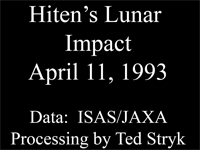November 15, 2017
Before Kaguya
Originally published May 10, 2008

image by Hiten, processed by Ted Stryk
Nearly 15 years before Kaguya, Japan sent a probe to the Moon, just to see if they could. It was called Hiten and it was actually meant to be an Earth-orbiter. Here is the story of how it ended on the Moon, with these images from a navigation camera tracking its last orbit. Ted has found the images, cleaned them up and presents them here. He writes: this is my processed version of the Hiten impact sequence from April 10, 1993. The ONS (Optical Navigation System) was only a 4 bit sensor that digitally compensated for the spacecraft rotation, so the images are not spectacular. Still, it was the first non U.S. or Soviet lunar mission, and it is a neat little sequence. Hitan crashed near Furnerius at 34.3° S 55.6° E. Perhaps the LRO high resolution camera (0.5 m) will image its wreckage. Or more fittingly, maybe the 10 m per pixel Terrain Camera on Kaguya can image its older sibling's area of disturbance.
Chuck Wood
Related Links
Ted rescues little known Moon images: Nozomi, Stardust
Yesterday's LPOD: Hooray!
Tomorrow's LPOD: Volcano M3?
COMMENTS
(1) From the looks of it, this wonderful series of images that Ted has put together suggests that the angle of descent must have been in the highs. Piccolomini (the crater seen just on the edge of the terminator and ending at Rupes Altai in the last-ish image) seems to grow very rapidly. With craters Funerius and Stevinus -- the area where Hiten is believed to have landed between -- just some ~ 700 km away from Piccolomini, the angle I would guess is in the 60s, but, I'm open to correction. Knowing the rate of altitude decrease that Hiten experienced during these last stages would, of course, define the angle query above. Still, a very nice tribute to Hiten -- well done Ted. John -- www.moonposter.ie
(2) There is a very good Podcast from 'Berkley Groks' (8/22/2007) found here http://www.ocf.berkeley.edu/~clgroks/907to707.html with an interview with Dr. Ed Belbruno and how he came up with his Low Energy Transfer system and how he was able to help the Japanese rescue their mission... very informative. Nice job Ted.
Mark
COMMENTS?
Register, Log in, and join in the comments.



